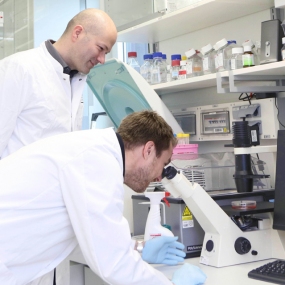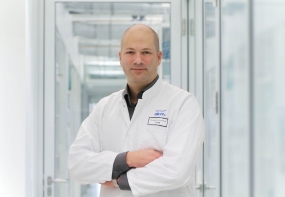
Biosafety

© DKFZ/Jutta Jung
Daily work routine of the more than 1,300 scientists at the DKFZ for the most part takes place in laboratories with different safety levels. Biological safety levels (at DKFZ: BSL1-BSL3) are based on the risk classification of the biological (or biomedical) work carried out. Each laboratory is designed around the safety level of its research, including the laboratory equipment, the specific working practices, and the typical protective equipment worn. On the one hand these precautions are designed to protect employees, and on the other hand the environment and the general public. The Biosafety Unit is responsible for and controls the safe handling of natural biological agents and genetically modified organisms (GMOs) at the DKFZ, while at the same time ensuring compliance with the numerous legal requirements and regulations.
"We ensure that our laboratory staff can go home in the evening in the same healthy condition as they arrived that morning."

Dr. Timo Kehl, Head of Biological Safety at the DKFZ
© DKFZ/Jutta Jung
Dr. Timo Kehl is Head of Biological Safety at the DKFZ. In this interview, he explains why his area of responsibility has a central role for a research institution like the DKFZ.
You are heading the Biosafety unit at DKFZ. What exactly does your job involve?
At DKFZ, we run about 20,000 square meters of laboratory space of biosafety level 1-3, where the numerous research groups conduct research with a wide variety of biological agents. This includes a broad portfolio of potential hazards for employees and our environment - from possible infections, intoxication, allergic reactions to unintentional release into the environment. In summary, together with my team, I ensure that our laboratory staff can go home in the evening in the same healthy condition as they arrived that morning.
Safety in the laboratory is primarily the responsibility of supervisors and laboratory staff; individual employees are responsible for their own safety and that of their colleagues. This is where we come into play: we support our scientists with appropriate expertise in dealing with the numerous biological agents, dedicated instructions for action, hygiene plans, advice on the procurement of laboratory equipment, laboratory renovations, behaviour in the laboratory, and much more. In Germany, handling of biological agents is very strictly regulated according to several laws and ordinances. All activities carried out at DKFZ have to be registered with the governmental authorities, workflows have to be documented in detail and have to pass regular inspections by the regulatory authorities. Within this legal framework, my team and I, as "Biosafety Officers", control and monitor the implementation of the legislation, including the Genetic Engineering Act, the Protection against Infection Act and the Biological Agents Ordinance. All official procedures at our centre are handled by the Biological Safety Unit. We also support the scientific working groups and the DKFZ in advance of and during regular audits conducted by the different regulatory authorities.
Furthermore, in my function as "representative of the operator", I represent the DKFZ management board in all questions and matters concerning biological safety, both internally and externally. This makes me, for example, the direct contact person for the various governmental authorities.
Why is biological safety a central topic in a biomedical research institution?
Biomedical research institutions, such as the DKFZ, work with various genetically modified organisms (GMOs), microorganisms (bacteria and viruses) and medical specimens. The DKFZ uses these biological agents for research into the development of cancer, new therapies and prevention. Depending on the circumstances, this work might involve a certain risk for the scientists themselves, other staff at the centre, or even for the environment. On the one hand, people could become infected with biological agents through accidents and in turn unintentionally infect colleagues or other fellow human beings, thereby spreading pathogens to the outside world. On the other hand, microorganisms could inadvertently enter the environment through the air or wastewater from the laboratory.
The task of the Biosafety Unit is to assess the risks posed by biological agents and, at the same time, to develop and implement measures so that all scientists, employees, the general public and our environment are protected from the possible dangers inherent in research. In such risk assessments, and the derivation of the appropriate measures, we examine, e.g. who could potentially be affected by an infection, by what means and how quickly this could happen, and what is ultimately the probability of an infection if one has come into contact with corresponding substances. In addition to infections, possible allergenic effects also play an important role and, in all cases, of course the consideration of available therapy options.
In Germany, there is a large number of complex laws, guidelines and regulations that research centres must implement. For a centre like DKFZ, it would be very inefficient if each research group had to deal with these issues separately. That is why the DKFZ has had a Biosafety Committee and a dedicated unit dealing with these issues for almost 30 years. The DKFZ is a pioneer and role model for other institutes in terms of organisational structure and scope in this field. Biosafety at the DKFZ has always adapted quickly to the increasing complexity and speed of research. In addition to traditional consulting and auditing, the DKFZ offers scientists and working groups a broad portfolio of services and support to ensure that regulations do not under any circumstances become the bottleneck of research.
Our support includes the management of the central S2/S3 laboratories at DKFZ. These central laboratories provide DKFZ researchers with a modern working environment in which they can carry out high-risk research safely, quickly, in a resource-efficient manner and with minimal organizational and regulatory effort.
The DKFZ laboratories work with biological agents, genetically modified organisms and pathogens that pose different potential hazards to employees. How are the scientists and biological laboratory assistants trained for this?
The safe and optimal operation of a laboratory requires a sense of responsibility and sufficient expertise among its supervisors and individual employees. It is therefore essential that all laboratory-associated employees are regularly kept up to date through safety trainings and continuing education. For this purpose, annual laboratory instructions are held in all departments, during which the specific hazards are discussed in detail. On request, we support, advise and train individual departments in this respect. In cooperation with the Education and Advanced Training department, we offer tailor-made workshops and teaching modules on the subject of biological safety, right from the start of employment or training in order to impart the necessary knowledge in handling biological agents and safe laboratory operation. We have intensive support processes for new research groups and international research groups, usually in the form of personal discussions and group-internal training. [This includes also bilingual working and information documents.] Our aim is to bring all employees in our institute to the same safety standard and to provide the best possible support. Our close management of the central S2/S3 safety laboratories is ultimately because of the complexity of safety regulations and legal requirements. In addition, a large number of information material, instructions, templates and infographics are available to all DKFZ employees in German and English on the Biological Safety intranet pages.
Contact
Biological Safety
Tel: +49 6221 42 3667
Mail: biosafety@dkfz.de
